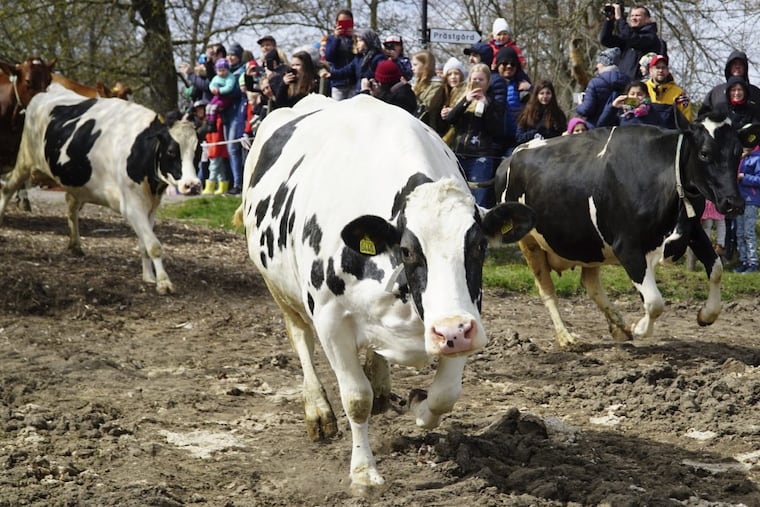Why are we so comically clueless about dairy?
Why do cows have to be milked? The answer may surprise you

It was great fun to learn recently that 7 percent of U.S. adults — more than the population of Pennsylvania! — say they believe chocolate milk comes from brown cows.
It's one data point in a survey the Innovation Center for U.S. Dairy conducted among 1,000 American adults testing folks' knowledge of agribusiness. But the dairy-backed survey skipped a few other basic questions people might have trouble answering.
Here are two: Why do cows give milk? Why do they need to be milked?
When I pose these questions, full-grown well-educated people often hem and haw and then express mild surprise at the answer: Cows are mammals and lactate only when they've given birth, in order that they can feed their babies.
And the follow-up: If that milk is for a calf, how is there enough extra for humans?
Easy: The calf doesn't drink the milk — we take all of it — because within a day or so of being born, the calf is taken from its mother forever. If it's a boy, it goes into confinement to live alone on milk replacer for a few months, then to be slaughtered and served as veal.
If it's a girl, she'll be inseminated, then spend the rest of her short life pregnant and/or lactating, reimpregnated every year until her milk flow declines, at which point she'll be killed and served as hamburger.
Of course, not every farm is the same: Some cows endure squalid, horrific environments, others modern, well-lit efficiency. Some spend lives attached to milk machines while others have their milk taken by gentle family farmers. Fundamentally, though, all cows are used as female bodies whose job is to reproduce, have their children stolen and lactate for profit.
During my 13 years as a milk-drinking vegetarian, I didn't grasp any of this, and it's a good thing no one asked me the first question. After all, "cows are a special kind of animal that gives milk year-round" sounds silly when said aloud, but it seems to be a tacit, unexamined belief of many American adults – easily more than 7 percent.
Back then, I also didn't know that "lactose intolerance" is the default setting for human bodies, that the one ethnicity for which a majority easily digests lactose is white people. Nor did I know that consuming dairy is unnecessary – leafy greens and cruciferous veggies provide calcium in a package with many other much-needed nutrients and without growth hormones (which all milk contains), cholesterol and bodily residues whose dangerous bacteria must be killed by cooking (pasteurizing). Once I knew, I vowed to ditch dairy.
So why are so many of us in the dark? With no single definitive answer, here are a few clues: 1) Ongoing attempts to criminalize visual documentation via "ag-gag" laws; 2) the "Four Food Groups" of yore that presented cow's milk as a major necessity; 3) prominent dairy ad campaigns like "Got Milk?" (paid for by industry) and super-cheesy Domino's pizza (paid for by you and me via the USDA); and 4) our natural desire not to be involved in needless exploitation.
Since we were all coercively involved as young children ("drink your milk!"), it's hard now to change habits when we find out they contradict our own values — simpler to look away and hope everything's OK. But the more we learn about dairy's heartbreaking reality, the clearer it is that it's time to quit.